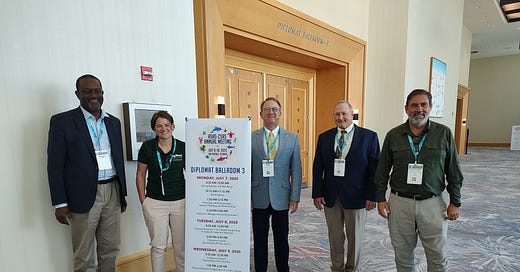I’ve been traveling a great deal lately. These journeys have given me many of what I call “Mountain Top” experiences - There’s the preparation and effort to reach these metaphorical summits where you can take a rest break, bask in the view, and begin to appreciate the accomplishment. Soon, however, you must begin the descent.
The 2025 ASAS-CSAS Annual Meeting has been one such summit. I submitted a proposal for their Livestock Symposium which the American Society of Animal Science Program Committee accepted. Building on the 2024 International Summit on the Societal Role of Meat and Livestock, and its Denver Call for Action (and the Dublin Declaration of Scientists on the Societal Role of Livestock from the 2022 Summit), this symposium was intended to share information that was presented at these summits and to increase awareness within the animal science community of scientists. [Two issues of the Animal Frontiers1 journal were dedicated to refereed papers written by the summits speakers - Volume 13, Issue 2, April 2023 & Volume 15, Issue 1, February 2025 ]
The symposium was titled “The Essential Societal Role of Livestock, Today and Tomorrow.” I was honored to have four top scientists join me in this effort, most of whom have been involved in the International Summits.
I produced the following videos with DaVinci Resolve using audio recordings I captured with my Zoom H2 recorders and jpegs from the speakers’ PowerPoint files. Pdfs of the presentations and the jpegs can be found here.
Keith E. Belk, PhD from Colorado State University led the symposium with a presentation entitled “2024 International Summit: The societal role of meat and livestock.” He described the origin of the Summits, the key points from the Denver event and why action by animal scientists and scientists in related disciplines is needed.
Adegbola T. Adesogan, PhD from the University of Florida followed with his presentation “Livestock’s vital role in nourishing the world.”
Sara E. Place, PhD from Colorado State University’s AgNext and Department of Animal Sciences gave a balanced presentation demonstrating that, indeed, “Sustainable food systems require livestock.”
After the break, Paulo C. F. Carvalho, PhD from the Universidade Federal do Rio Grande do Sul gave his presentation “Livestock AND Crops: Integrated Systems” in which he shared data from long-term field experiments that he and his collaborators have conducted which demonstrates the increase in crop yields due to the effects produced by grazing cattle and sheep (“herbivory”) during cropping rotations - further refuting the land use arguments against livestock production.
My presentation, “Humanity's Existential Crisis: Malnutrition and chronic illnesses,” was the final one of the Symposium. I attempted to show that humanity, across all income-level countries, actually needs MORE animal source foods, that malnutrition is a greater burden than typically recognized, that dietary “conventional wisdom” is an obstacle to the work that must be done, and that a metabolic health-informed perspective offers enormous hope for humanity.
I’m grateful to the speakers who generously agreed to participate.
I’ve heard it said that every time you give a talk you end up giving three: There’s the one you plan to give; The one you give; And the one you think you should have given. It’s no different this time. The experience of proposing, organizing, and hosting a symposium like this at a major scientific society meeting was occasionally stressful, but I’m pleased with the results.
Another issue that might be of interest is “Foods of animal origin: a prescription for global health” Animal Frontiers, Oct 2019. Vol 9, No. 4





